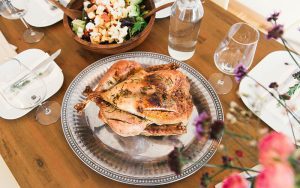Are you hosting the big meal this year? If so, you may be reaching for old family recipes that make the Thanksgiving meal not only delicious but also nostalgic. But if you’re hosting a guest with allergies, you have a new challenge on your hands.
You may be wondering: “What if I accidentally expose my guest to triggering food allergens?” “How do I make things taste as good if I can’t use certain ingredients?” “Do I need to cook separate dishes for my food allergic and non-food allergic guests?”

(Free-Photos / pixabay)
Below are some tips to ease your concerns about cooking allergy-free so that both you and your allergic guest(s) can enjoy Thanksgiving dinner to the fullest:
Communicate. Approach your guest in advance with tactful curiosity. Find out exactly what your guest is allergic to and the severity of their allergy. Not only does this help you prepare a meal that will be satisfying and safe for your guest, it shows that you genuinely care about them and their food allergy journey.
Ask for help. It can be overwhelming to cook for someone with food allergies if you haven’t had experience with it before. Your guest may offer to bring a safe dish or two. If not, there are tactful ways to ask for help:
- “I’ll bet you’ve gotten good at cooking around your allergies. Would you be willing to bring one of your favorite dishes?”
- “I’d love to use a good substitute for milk and butter so that I can steer clear of your dairy allergies—I’m just not sure where to get the best products. Would you be willing to drop off some of the dairy substitutes that you like best so that I can incorporate them into recipes?”
You can also invite your friend over to help you cook a few allergy-friendly dishes. They will get a chance to share their expertise, and you’ll increase your knowledge of allergy-free cooking.
Clean. If you’ve spent much time cooking, you already know something about avoiding cross-contamination. A prime example is washing your knife after you cut raw chicken so that you don’t get chicken juice all over the carrots you’re slicing. That would be bad! It’s also bad to contaminate seemingly harmless dishes with food proteins that would trigger your guest’s allergies. That is why you need to be very careful to clean all surfaces (such as cutting boards), utensils, dishes, dishtowels, etc., as you move between foods.
Imagine dipping a spoon into peanut butter for peanut butter pie, failing to completely clean the spoon, and then using it to stir your mashed potatoes. If your guest has a peanut allergy, they’ll get a very unpleasant (and potentially dangerous) surprise as they eat their mashed potatoes. All it takes is a trace of an allergen to kick off an allergic reaction.
Cook allergy-free first. To make cleaning easier and minimize cross-contamination, plan to cook your allergy-free recipes first.
Buy pre-made products. It used to be that there were very few allergy-free foods at the supermarket. But as food allergies have increased, so, too, have allergy-free prepared foods. You can relieve some Thanksgiving stress by purchasing these products. It will mean less time in the kitchen for you and an assurance that the foods will be free of cross-contamination from allergens.
For a guest with wheat allergies, you can buy stuffing alternatives (think wild rice and quinoa) as well as wheat-free dinner rolls. For milk or egg allergies, you can buy allergy-free custard and cream pies.
Label serving utensils. Knowing that the stuffing spoon can easily end up in the green bean casserole as foods are passed around, make sure to label serving utensils so that they stay in their designated dish. This can minimize cross-contamination as your guests dish up.
Try making allergy-free dishes for all. It’s hard not to feel a little singled out when you have food allergies. Everyone gets to enjoy the full spread of Thanksgiving foods while you’re confined to a few isolated dishes. You can make your guests feel included by making the traditional dishes with allergy-free ingredients. With so many high quality “safe” ingredients to substitute in, your guests may not even notice a difference from the usual recipes.
Give a compliment. If your guest brings an allergy-free dish and offers it up for general use, try it out and praise your guest for what you like about their recipe. Everyone wants to feel like they’ve contributed in a positive way.
Keep a good attitude. You can look at your guest’s allergies as one more thing that’s complicating your meal plan, or you can look at it as an opportunity to help your guest feel valued and included. Living with food allergies is difficult so any support you show can go a long way—especially during a holiday that tends to favor people without food allergies.
Food allergies are challenging because researchers are just now discovering viable food allergy treatment programs. At AllergyEasy, we’re proud to be one of a small group of clinics nationwide that offers allergy treatment for milk, nut, wheat allergies, and more. We recognize the many challenges associated with food allergy and are proud to be part of the solution. We are working hard to create a world where people can enjoy more of the foods they love without fear of symptoms.


